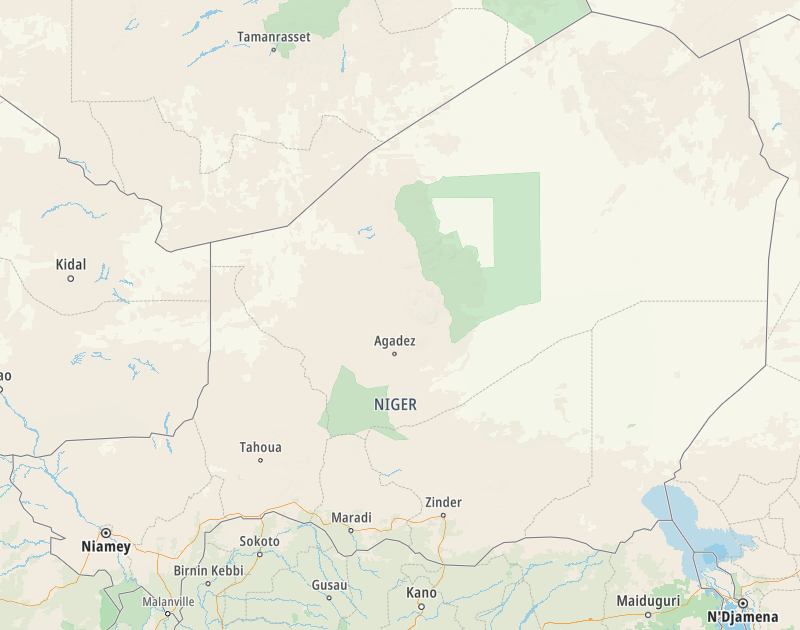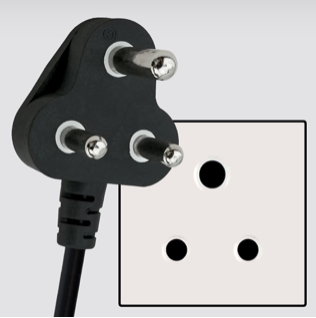Niger / République du Niger – Let’s explore here
What’s it like in Niger?
Niger is a landlocked, mainly flat, desert country in west Africa, about five times the size of the UK. The terrain is mostly Saharan desert, and in the north of the country lie the Aïr Mountains, which create a microclimate supporting a wide variety of life. The highest point is Mont Idoukal-n-Taghès, in the centre of the country, at 6,568 ft (2,002 m) above sea level.
The country has a long, rich and very troubled history, involving much political instability, resulting in it now being one of the least developed and poorest countries on the planet. It shares land borders with Algeria, Benin, Burkina Faso, Chad, Libya, Mali and Nigeria.
The population of Niger is around 26½ million people (2024), about 1½ million of whom live in the metropolitan area of the capital, Niamey. It has a very young population, almost half the population are under the age of 15 years.

A bit about the history of Niger
Early History and Indigenous Societies
Islam and the Spread of Empires
Niger has a long history of indigenous cultures and societies, with evidence of human habitation dating back to the prehistoric era. Early civilisations in the region included the Nok culture (around 1000 BC to 300 AD), known for its distinctive terracotta sculptures. The Sahel region, which includes much of Niger, has been home to various nomadic peoples, including the Tuareg and Fulani, as well as agricultural societies in the Niger River basin. These communities developed trade networks across the Sahara and into sub-Saharan Africa.
Islam was introduced to Niger in the 8th century through trade routes connecting northern Africa with sub-Saharan regions. By the 16th century, the Songhai Empire, one of the largest and most powerful empires in West Africa, dominated much of what is now Niger. Following the fall of the Songhai Empire in the late 16th century, the region fragmented into smaller states and territories, often influenced by Islam and trade.
In the 19th century, the spread of European colonialism and the encroachment of French and British forces began to shape the future of the region. The French began their expansion into West Africa during this period, seeking to control trade routes and access to resources, while competing with other European powers in the scramble for Africa.
French Colonisation
By the late 19th century, France established control over Niger, incorporating the region into French West Africa. The French colonial administration was primarily concerned with exploiting Niger’s resources, particularly its mineral wealth, including uranium, and using the local population for forced labour. The colonial period brought significant changes to Niger’s political and social structures, including the introduction of new administrative systems and a shift towards cash crops and the export economy.
Niger, like many other colonies, experienced resistance to French rule. Anti-colonial movements emerged, particularly during the early 20th century, as local leaders and intellectuals sought greater autonomy. However, the French maintained control, and it wasn’t until after World War II that significant movements for independence began to take shape across French West Africa.
Path to Independence
The post-war period was a time of significant change for African colonies. The weakening of European powers after World War II, combined with rising nationalist sentiment, led to growing calls for independence. In Niger, the political landscape was shaped by leaders such as Hamani Diori, who was involved in early movements for independence. Niger’s first political party, the Niger Progressive Party, was founded in 1946 and advocated for greater self governance. In 1958, Niger became a self governing republic within the French Community, a loose association of former French colonies. Two years later, in 1960, Niger formally gained independence from France, with Hamani Diori becoming the country’s first president.
Early Years of Independence and Political Instability
After gaining independence, Niger faced significant challenges, including economic hardship, poverty and underdevelopment. The country’s economy was heavily dependent on agriculture, and the lack of infrastructure posed obstacles to economic growth. The French, while no longer in direct control, maintained a strong presence through economic and military ties. President Diori’s government was characterised by a focus on modernisation and attempts to build a unified, stable state. However, his administration faced significant challenges, including corruption, food shortages and political unrest. In 1974, Diori’s government was overthrown in a military coup led by Lieutenant Colonel Seyni Kountché, marking the beginning of a period of military rule in Niger.
Military Rule and Authoritarianism
Following the 1974 coup, Seyni Kountché became the de facto leader of Niger and implemented a military dictatorship. The Kountché regime focused on maintaining internal stability, improving infrastructure and promoting economic self-sufficiency. Despite these efforts, the country’s political system remained authoritarian, and political opposition was suppressed. Kountché also struggled to address Niger’s underlying economic problems, including droughts, famine and a lack of industrialisation.
Kountché remained in power until his death in 1987, at which point he was succeeded by his deputy, Ali Saibou. Saibou’s presidency saw limited political reform, but Niger continued to face economic stagnation, political repression and growing dissatisfaction among the population. In 1991, after widespread protests and growing demands for democracy, Saibou was forced to implement democratic reforms, leading to the adoption of a new constitution and the establishment of multi party elections.
Return to Democracy
In 1993, Niger held its first democratic elections under the new constitution, and Mahamane Ousmane was elected president. His administration was marked by efforts to stabilise the country and address economic challenges, but political tensions persisted. A coup in 1996, led by Colonel Ibrahim Baré Maïnassara, ousted Ousmane from power, marking the country’s return to military rule. Maïnassara’s government was short lived, as he was assassinated in another coup in 1999, which led to the election of a civilian government under President Mamadou Tandja. Tandja, elected in 1999, initially promised democratic reforms but later became increasingly authoritarian, consolidating power and extending his rule through constitutional amendments.
Political Instability and Economic Challenges
Tandja’s presidency was marked by growing concerns over democratic backsliding, corruption and Niger’s economic struggles, particularly with the fluctuating price of uranium, a key export. In 2009, Tandja sought to extend his rule by attempting to alter the constitution to allow him to stay in power, but this move was met with widespread protests and opposition. During 2010, another military coup ousted Tandja, and the country once again faced political uncertainty. In 2011, a civilian government was established following elections, and Mahamadou Issoufou, leader of the Nigerien Party for Democracy and Socialism, became president. Issoufou’s administration focused on stabilising the political system, fostering economic growth, and addressing issues such as poverty and security.
Economic Growth and Security Challenges
During Issoufou’s presidency, Niger experienced some positive economic growth, particularly in sectors like agriculture, mining and energy, with increased investments in uranium extraction and energy infrastructure. However, the country’s economy remained vulnerable to external shocks, and poverty remained widespread.
Niger also faced significant security challenges, particularly from extremist groups operating in the Sahel region, such as Al-Qaeda in the Islamic Maghreb and the Islamic State in the Greater Sahara. These groups have carried out attacks in Niger, particularly in the border regions with Mali and Burkina Faso, and have contributed to ongoing instability in the wider Sahel. The government, along with international partners, including France and the United States, has worked to combat these extremist groups, but the threat remains.
In 2021, Niger held presidential elections, which saw Mohamed Bazoum, a member of the PNDS and a close ally of Issoufou, elected as president. Bazoum’s victory marked the first peaceful transfer of power in Niger’s history, representing a significant milestone in the country’s democratic development. However, the security situation remained fragile, with attacks by extremist groups continuing to affect the population.

Niger road trip
Our Nigerien road trip is part of a much larger African road trip.
Our current planned road trip takes us close to Niger, and we may make a detour to visit the country, probably from either Benin or Nigeria. Although due to the current turbulence in the region, we may visit at another time. Whenever we do visit, hopefully our journey will improve our knowledge of this intriguing and beautiful country, and enable us to meet some interesting people. We’ll be updating this page at that time – don’t forget to check back 🙂
Map of Niger

What’s it like to drive in Niger?
They drive on the right hand side of the road in Niger. In the main, roads are very poor, with many being unsurfaced dirt tracks. Driving standards are also poor.
We’ve also created a dedicated page to driving abroad, which you might find helpful 🙂
What currency do they use in Niger?
In Niger they use the West African CFA franc. Cash is widely used. The use of credit / debit cards is not widely accepted. Travellers cheques are not readily accepted. There are very few ATMs outside of the capital, Niamey.
The West African CFA franc is used in Benin, Burkina Faso, Guinea-Bissau, Côte d’Ivoire, Mali, Niger, Senegal and Togo.
You should make yourself aware of the amount that your bank charges you for using credit and debit cards abroad. Often credit cards are cheaper for purchasing items directly, and for withdrawing cash from ATMs.
What language do they speak in Niger?
They mainly speak Hausa in Niger, although French is the official language, although not so widely spoken. English is not widely spoken.
What time zone is Niger in?
Remember, when you’re planning your next trip to take a look at what time zone it’s in.
Do I need a visa to visit Niger?
We’ve created a dedicated, more comprehensive page on visas, which you should find helpful. Check it out!
Is wild camping legal in Niger?
Yes, wild camping is fine in Niger.
What plug / socket type do they use in Niger?
In Niger they use plug / socket types C, D, E and F.




Health issues in Niger
Is it safe to drink water in Niger?
No, it is not safe to drink tap water in Niger. Bottled water is readily available throughout the country.
What vaccinations are required for Niger?
This NHS website is kept up to date with all relevant information on vaccinations in Niger.
Phones in Niger
What is the country calling code for Niger?
The country calling code for Niger is +227
What are the emergency phone numbers in Niger?
- The emergency number for police in Niger is: 17
- In Niger, the emergency number for ambulance is: 15
- The emergency number for fire in Niger is: 18
If you’ve got some useful info that you’d like to share, let us know!
And don’t forget to check out all the other pictures!
